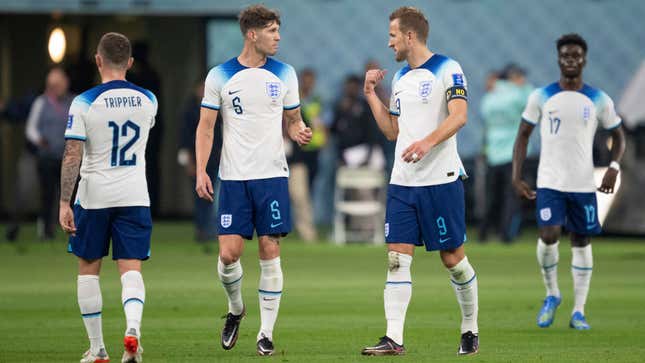7 World Cup Nations Ditch LGBTQ+ Rights Armbands Over Yellow Card Threat
FIFA threatened players and coaches with disciplinary actions, including yellow cards, should the team captains wear the anti-discrimination armbands.
EntertainmentEntertainment

While there are few things more exciting than watching attractive men play sports whose rules you only vaguely grasp, this year’s FIFA World Cup, which kicked off over the weekend in Qatar, continues to bump itself down on the list of entertaining winter pastimes. As of today, seven European countries—England, Wales, the Netherlands, Belgium, Denmark, Germany, and Switzerland—have announced that their teams will not be wearing the OneLove armbands that condemn discrimination against the LGBTQ+ community, sparking outrage amongst fans and activist groups alike.
“FIFA has been very clear that it will impose sporting sanctions if our captains wear the armbands on the field of play,” the English Football Association said in a statement published earlier today. “Our players and coaches are disappointed—they are strong supporters of inclusion and will show support in other ways.”
The decision came after FIFA allegedly threatened players and coaches with disciplinary actions—including being booked (a yellow card) or even being forced to leave the pitch (a red card)—should they wear the armbands, according to the Guardian. The gesture, which was popularized during the 2020 Euro Cup, is far less risky than, say, taking a knee during the national anthem to protest racial violence. And yet, these soccer bros still couldn’t seem to deliver.
Many have been quick to criticize the teams themselves, while others have directed their anger at FIFA. Even before the World Cup began, FIFA was already under heat for choosing to host the tournament in Qatar, a country that is openly homophobic and has a track record of human rights violations. Given just how endangered members of the LGBTQ+ community are in Qatar, it’s disappointing—but maybe not surprising—that these teams would choose their love for the game (and the money that comes along with it) over standing up for injustices that impact countless individuals globally.
-

-

-

-

-

-

-

-

-

-

-

-

-

-

-

-

-

-

-

-

-

-

-

-

-

-

-

-

-

-

-

-

-

-

-

-

-

-

-

-








































